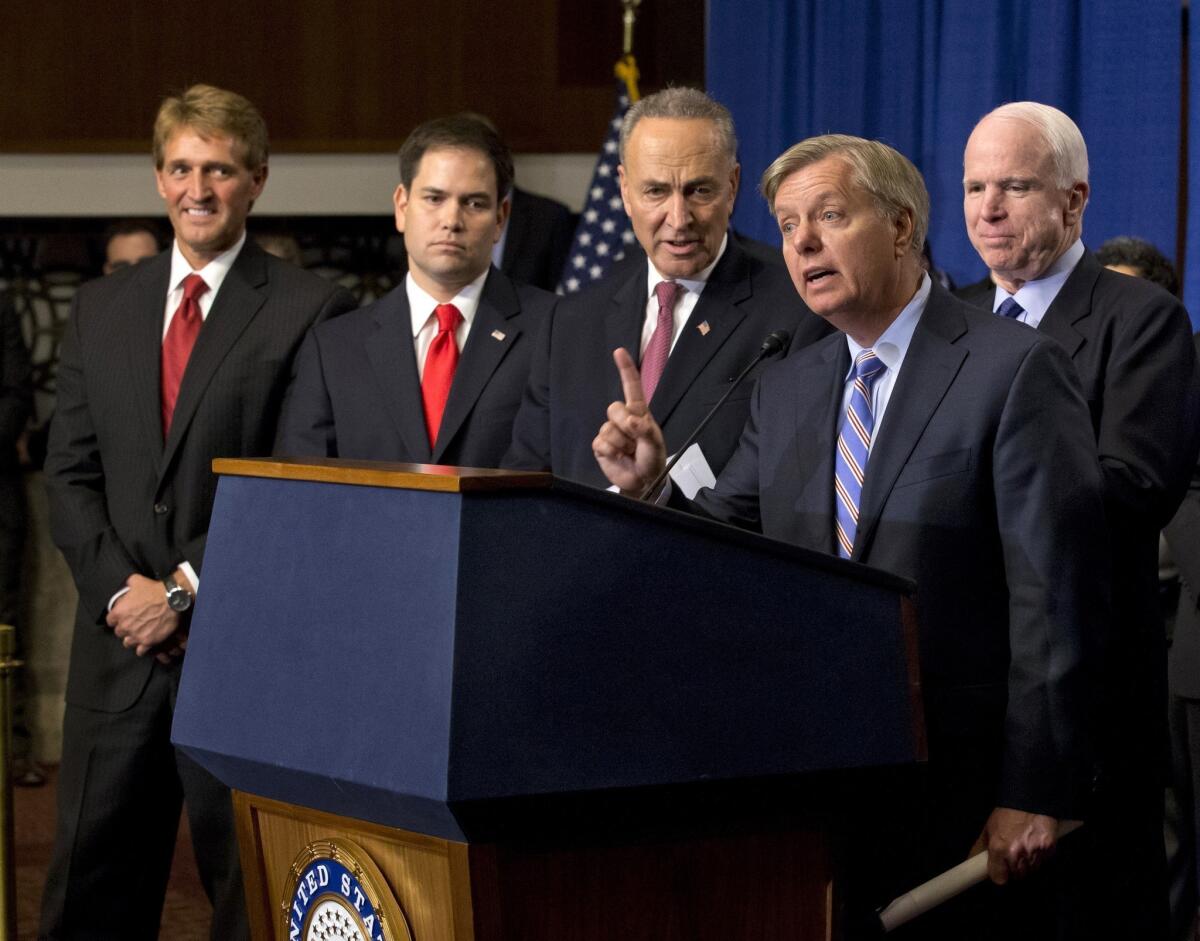Senate immigration bill teeters as it tilts rightward

WASHINGTON — The Senate immigration bill is poised to undergo a decidedly rightward shift in an attempt to attract more Republican votes, but that threatens to erode bipartisan consensus.
Democratic and Republican authors of the bill have expressed a willingness to make changes and toughen the border security provisions as the sweeping immigration overhaul heads to the floor next week. But a debate has emerged over how much is too much.
Leading the effort to engage Republicans is Sen. Marco Rubio (R-Fla.), who is struggling to persuade reluctant conservatives to embrace a bill he helped write that they do not support. Rubio’s performance could determine not only his political standing as a potential 2016 presidential contender, but the fate of the immigration overhaul.
“It’s very simple. If people want immigration reform, we’re going to have to improve the border security elements of the bill,” Rubio said Wednesday as he emerged from a private meeting with the House conservative caucus, which has been resistant to the Senate overhaul. “One of the reasons I was asked to join this effort was to help bring Republicans on board. That’s what I’m trying to do.”
But among supporters of the legislation, a division has emerged between those who are willing to allow changes to win a robust Senate majority and those who prefer a narrower margin rather than yield too much ground.
Sen. Charles E. Schumer (D-N.Y.), an architect of the bill, has aimed for a 70-vote threshold in the Senate, which some believe would provide bipartisan political momentum that would pressure the Republican-controlled House to act.
Others are not sure Republicans would react to such a prodding, and do not want Democrats to bend on what is already a bipartisan effort crafted by four Republican and four Democratic senators.
Marshall Fitz, an immigration expert at the Center for American Progress, a liberal think tank in Washington, is concerned that Republicans are pushing for changes to the bill in exchange for getting individual votes.
“This process shouldn’t turn into a transactional bazaar — bring an idea and bring your vote,” Fitz said.
A separate bipartisan effort in the House hit another roadblock late Wednesday when a key conservative, Rep. Raul Labrador (R-Idaho), dropped out, those familiar with the group confirmed.
The Senate bill would be the most comprehensive reform of immigration law in a generation, anchored by a 13-year path to citizenship for the estimated 11 million people in the U.S. who entered illegally or overstayed visas.
As written, the bill would provide $4.5 billion to beef up surveillance and enforcement to prevent illegal crossings along the southern border. More drones and 3,500 extra Customs and Border Protection officers would be deployed, along with double-layer fencing in some areas. An additional $2 billion would be available if needed.
A proposed amendment from Sen. John Cornyn (R-Texas) would add $1 billion more a year for six years and boost manpower to 10,000 Customs and Border Patrol officers.
Boosting resources would be acceptable to Democrats and the bipartisan authors. But Cornyn also wants to prevent immigrants from getting green cards until the Homeland Security secretary and the comptroller general — head of the Government Accountability Office — jointly certify that certain standards for border security have been met. That could face resistance.
Advocates for immigrants are particularly concerned that the path to citizenship would be derailed by setting up border security goals that cannot be met. Changes in committee already bolstered security provisions and pushed the bill to the right.
“We’re concerned Sen. Rubio not give away the store to get Republican votes,” said Frank Sharry, executive director of America’s Voice, an advocacy group. “Is there wiggle room on border security for Republicans to grow the vote? Yes.”
The bill would need a filibuster-proof 60-vote majority to pass the Senate, where Democrats hold 52 seats, buttressed by two independents who caucus with them. No Republicans except the bill’s four GOP authors support it.
The list of amendments is growing.
Sen. Rand Paul (R-Ky.), who has indicated he may be open to immigration reform, wants Congress to vote annually that progress is being made to secure the border; if not, the path to legalization would be halted.
Another Republican, Sen. Orrin G. Hatch of Utah, has said he cannot support the bill unless his proposals are considered to prevent immigrants from receiving certain tax credits.
And Sen. Joe Manchin III of West Virginia, perhaps the most conservative Democrat in the Senate, wants to stiffen the education requirement in the Dream Act, the part of the bill that provides an expedited path to legal status for adults who were brought to the United States as minors if they serve in the military or attend college.
Manchin’s change would require “Dreamers,” as the young immigrants call themselves, to graduate from “any institution of higher learning,” according to a summary. Advocates for immigrants say the graduation requirement would be a burden for many young people who take longer to finish college because they must work part time — forcing them to choose between gaining full legal status and pursuing their education.
“If you’re asking to accelerate the process, then you have to make a commitment and complete something,” Manchin said this week in a brief interview.
Adding the measure would not guarantee his vote, the West Virginian said, but “it would help tremendously.”
More to Read
Sign up for Essential California
The most important California stories and recommendations in your inbox every morning.
You may occasionally receive promotional content from the Los Angeles Times.












